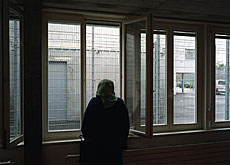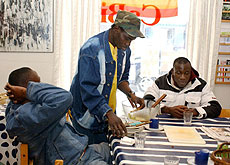UN again criticises Swiss asylum policy

The United Nations refugee agency (UNHCR) has voiced "serious concerns" about moves in parliament to introduce a more restrictive asylum law.
On Monday, the House of Representatives followed the Senate in tightening asylum procedures.
The Geneva-based UNHCR said on Tuesday that some of the planned measures would make Swiss law among the most severe in Europe.
“We are disappointed that despite the continuous decline in the numbers of asylum requests over the past few years in Switzerland, a new law has been adopted that could make asylum procedures excessively difficult for real refugees,” commented UNHCR spokesman Ron Redmond on Tuesday.
According to the agency’s figures, requests for asylum declined by 32 per cent between 2003 and 2004 and the fall was 44 per cent in the first six months of this year compared with the same period last year.
“We have expressed on numerous occasions our serious concerns about some measures,” Redmond told a news briefing.
He said the UNHCR was particularly preoccupied by the fact that only valid travel documents or identity papers will be accepted.
Many asylum seekers do not have the possibility to obtain such papers before fleeing their countries, the spokesman said.
Hans Lunshof of the UNHCR told swissinfo that he was concerned that under the proposed changes to the law it would “no longer be possible for asylum seekers to stay in Switzerland for humanitarian reasons”.
“The truth is that over the past few years many people have been coming [to Switzerland] from war-torn regions such as Bosnia-Herzegovina.”
Geneva convention
The UNHCR said it expects the Swiss authorities to respect each individual case as stipulated under the 1951 Geneva refugee convention.
“The fact of not having documents is recognised by the 1951 convention. It is not an unusual situation. This [planned] measure is among the most severe in Europe,” Redmond said.
He cited the case of refugees from Kosovo who fled from Serbian military action in 1999. Many left the province without any official identification.
The spokesman added that the agency was ready to cooperate with the Swiss authorities to try to create an “equitable and effective system”.
The UN body had last criticised Switzerland in March saying it “deeply regretted” moves towards stricter legislation against asylum seekers in Switzerland.
Church aid and refugee organisations as well as the Swiss section of Amnesty International also criticised the tighter controls.
Following the heated debate in parliament, the House voted in favour of the more restrictive policy, agreeing to drop admission on humanitarian grounds along with social welfare for rejected asylum seekers. Only emergency aid is being retained.
The chamber also rejected asylum procedures for most people arriving without valid identification.
The centre-left Social Democrats and Greens who opposed the changes have threatened to launch a referendum to force a nationwide vote on the issue.
Debate on asylum legislation now goes back to the Senate for the remaining differences to be ironed out.
swissinfo with agencies
The measures confirmed by the House of Representatives include dropping admission to asylum seekers on humanitarian grounds and exclusion from asylum procedures for the majority of people arriving without valid identity papers.
The House also ruled out social welfare for rejected asylum seekers.
But it rejected cancelling emergency assistance to those who do not want to leave Switzerland after a negative decision, in line with a Federal Court ruling.
The House raised the maximum detention for foreigners awaiting deportation to 18 months for adults and nine months for minors over 15.

In compliance with the JTI standards
More: SWI swissinfo.ch certified by the Journalism Trust Initiative











You can find an overview of ongoing debates with our journalists here . Please join us!
If you want to start a conversation about a topic raised in this article or want to report factual errors, email us at english@swissinfo.ch.